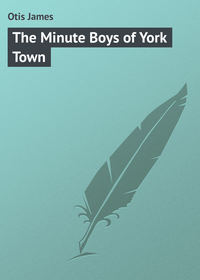
Ruth of Boston: A Story of the Massachusetts Bay Colony
It has also been decided that when we have a church, as we count on within a year, a goodly supply of ladders and buckets shall be kept therein for the use of the entire town, and then, when a fire springs out, our people will know where to go for tools with which to fight against it.
OUR OWN NEW HOME
It must not be supposed that because of our dwellings being unsightly on the outside, they are rough within, for such is not the case. Many of the settlers, as did father, brought over glass for the windows, therefore we are not forced to put up with oiled paper, as are a great many people living in this New World.
It was partly the dampness inside our homes, so Governor Winthrop believed, which caused the sickness in Charlestown, and therefore it was that my father insisted we should have a floor of wood, instead of striving to get along with bare ground which had been beaten hard. Our floor is made of planks, roughly hewn, it is true, but nevertheless it serves to keep our feet from the ground. We have on the door real iron hinges, instead of leather, or the skins of animals, as we saw in Salem.
Save for the roughness of the floor and the walls, the inside of my father's house is much the same as we had in England, for he, like all of Governor Winthrop's company who were able to do so, brought over the furnishings of the old home, and while some of the things look sadly out of place here, they provide us with a certain comfort which would have passed unheeded in the other country, because there we were not much better off in this world's goods than were our neighbors.
Here, when I see a table made only of rough boards spread upon trestles, I can get much pleasure out of the knowledge that we brought with us those tables which we had been using in England, and, when our dinner is spread, save for the difference in the food, I can well fancy myself in the old home. We have our ware of pewter and of copper, and our trencher bowls are of the best that can be hewn from maple knots.
In order that the walls and crevices, filled with moss and plastered over with clay, may not offend the eye, mother has put up all the hangings which she brought with her, and these, with some skins my father bought at Salem, hide entirely that which is so unsightly in other dwellings.
Contrasting our home with many which we saw in Salem, or in Charlestown, I am come to believe my lines are truly cast in pleasant places, and I strive to be thankful to God for having given me the father which I have.
THE FASHION OF THE DAY
I am afraid it may be almost sinful for me so to set my mind upon the garments which one wears, and yet I cannot but contrast my father with some of the common men in the village.
The ruff which he wears around his neck is always well starched, clean, and stands out in beautiful proportions. On his low, peaked shoes, mother ever has fixed rosettes, or knots made of ribbon. His doublet, which is gathered around the waist with a silken belt, is slashed on the sleeves to show the snowy linen beneath. His trunk hose, meaning those which reach from his waist to his knees, are of the finest wool. His stockings, when he is dressed to meet with the Council, are of silk, while his mandilion, or cloak, is always of silk or velvet.
Perhaps one may think such attire hardly befitting a wild place like this, yet I know of nothing which serves to set off a man's figure, making him seem of importance in the world, better than that he be clad with due regard to the fashion of the day. Master Winthrop would not present the gentlemanly appearance which he does if he wore, as do the common people here, a band, or a flat collar with cord and tassels, breeches of leather, and a leather girdle around his waist. If he had, as do they, heavy shoes with heels of wood, or if his clothing were fastened together with hooks and eyes, instead of silken points, and if his hat were of leather, would we be pleased to call him Governor?
My mother often says that it is unseemly in a child like me to speak of the clothing worn by gentlemen, and yet I have noticed often and again, that she is as careful of my father's attire when he goes out of doors as she was at home in England, where all gentlemen were dressed becomingly.
Verily one need not go abroad in tatters, or oddities, simply because of having come into this New World, where much of work is required, and he who cares for his personal appearance, to my way of thinking, is to be given due credit.
Surely so the Massachusetts Bay Company thought, for they furnished to every man who came from England to settle here, save it be those who could afford such things for themselves, four pairs of shoes and the same number of stockings; four shirts; two suits of doublet, and hose of leather lined with oiled skin; a woolen suit, lined with leather, together with four bands and two handkerchiefs, a green cotton waistcoat, two pairs of gloves, a leather belt, a woolen cap and two red knit caps, a mandilion lined with cotton, and also an extra pair of breeches. Of course such an outfit was for the common people, not the gentlefolk.
In our company, the boys are clothed exactly as are their fathers, and many of them present a most attractive appearance, although my mother would not think it proper for me to say so, much less to put it down in writing.
MY OWN WARDROBE
It surely cannot be wrong for me to think of that which I wear, for if the good Lord has given me a comely body, why shall I not array it properly? Or if it be wrong, why did my father buy for me those things, a list of which I am here setting down, not from vanity, but simply to show how kind were my parents?
I had a cap ruffle and a tucker, the lace of which cost five shillings a yard; eight pairs of white kid gloves, with two pairs of colored gloves, two pairs of worsted hose and three pairs of thread, a pair of laced silk shoes, and a pair of morocco shoes, not to speak of four pairs of plain Spanish shoes, or two pairs made of calf-skin for every day use; a hoop coat and a mask to wear when the wind blows too roughly, and a fan for use when the sun is hot. Susan had two necklaces, one of garnet and one of jet; but I had only garnets. Then I have a girdle with a buckle of silver; a mantle and coat of lutestring; a piece of calico to be made up when mother has time; four yards of ribbon for knots or bows, and one and one-half yards of best cambric. All these were bought especially for me when we left home, and surely it can be no sin that I take pride in them.
MASTER JOHNSON'S DEATH
It was shortly after coming to this town of Boston that we heard of the death of Master Johnson, Lady Arabella's husband. A friendly man was he, ever ready with a kindly word for us children, and we would have mourned his loss much more, but for knowing that it pleased him right well to go out of this world of sorrow, that he might join his wife in God's country.
Susan and I had hoped we should hear of no more deaths among those we cared for, after having come into this last place of abode, and the news of Master Johnson's taking away caused her superstitious fears to break out anew; but I reminded her that we were in God's keeping, whatsoever might befall, and that for us to look forward into the morrow, searching for evil, was the same as an injustice to our Maker, who would do toward us whatsoever seemed good in His sight.
As I look back now upon the time when our town of Boston first came into being, I can understand how well it is for us that we may not read the future. Had we at that time, when the winter was coming on, known how much of sorrow and of suffering was in store for us, before the earth would be freed from its bonds of ice, then I believe of a verity we must have given up in despair.
However, it is not for me to look ahead even in this poor attempt at setting down what we did in the new land. Rather let me go back to our home life, and tell somewhat concerning the odd dishes which were frequently set on our table.
MANY NEW KINDS OF FOOD
There is little need for me to say that we had lobsters in abundance, and of such enormous size that one was put to it to lift them. I have heard it said that twenty-pound weight was not unusual, and whosoever might could catch, in traps made for the purpose, all the lobsters he would.
As for other fish, I can not set down on one page of this paper, the many kinds with which the housewife might provide herself for a trifling sum of money. We often had eels roasted, fried, or boiled, because of father's being very fond of them, and mother sometimes stuffed them with nutmegs and cloves, making a dish which was not to my liking, for it was hot to the tongue.
Some of the good wives in Salem had shown my mother how to prepare nassaump, which those who first came to Salem learned from the Indians how to make: It is nothing but corn beaten into small pieces, and boiled until soft, after which it is eaten hot, or cold, with milk or butter.
Nookick is to my mind more of a dainty than a substantial food, and yet father declares that on a very small quantity of it, say three great spoonfuls a day, a man may travel or work without loss of strength. It is made by parching the Indian corn in hot ashes, and then beating it to a powder. Save for the flavor lent to it by the roasting, I can see no difference between nookick, and the meal made from the ground corn.
Mother makes whitpot of oat meal, milk, sugar and spice, which is much to my taste, although father declares it is not unlike oatmeal porridge such as is eaten in some parts of England; but it hardly seems to me possible, because of one's not putting sugar and spice into porridge.
We often have bread made of pumpkins boiled soft, and mixed with the meal from Indian corn, and this father much prefers to the bread of rye with the meal of corn; but the manner of cooking pumpkins most to my liking, is to cut them into small pieces, when they are ripe, and stew during one whole day upon a gentle fire, adding fresh bits of pumpkin as the mass softens. If this be steamed enough, it will look much like unto baked apples, and, dressed with a little vinegar and ginger, is to me a most tempting rarity. But we do not often have it upon the table because of so much labor being needed to prepare it.
Yokhegg is a pudding of which I am exceedingly fond, and yet it is made of meal from the same Indian corn that supplies the people hereabout with so much of their food. It is boiled in milk and chocolate, sweetened to suit one's taste after being put on the table, and while to English people, who are not accustomed to all the uses which we make of this wheat, it may not sound especially inviting, it most truly is a toothsome dainty.
The cost of setting one's table here is not great as compared with that in England, for we may get a quart of milk by paying a penny, or a dozen fat pigeons, in the season, for three pence, while father has more than once bought wild turkeys, to the weight of thirty pounds, for two shillings, and wild geese are worth but eight pence.
THE SUPPLY OF FOOD
The season had come when, if we had been in England, the people would have been gathering the harvest; but here we had none, having come so late in the year that there was no time to plant, and, consequently, we had no crops.
I had never before realized how necessary it is for people that the earth shall yield in abundance; but I came to know it now right well through hearing father, as he talked with mother regarding the fears which the chief men of the colony had concerning the supply of food.
Of course, girls such as Susan and I would not have been likely to learn anything of the kind, save that matters had come to such a pass as made the situation serious, in which case it was no more than natural we should hear our parents talking about it.
It seems, from what I learned, that a portion of the provisions brought from England were spoiled during the voyage, and also, that many of our people had taken with them no more than enough to sustain life for a month or two, believing that in this New World food of all kinds would be found in abundance.
Then again, many had bartered provisions, which they should have kept for the winter use, with the Indians in exchange for beaver skins, thinking thereby to make much money. So general had this traffic become, that early in September the Governor gave strict orders against it, and it was also ordered that no person in the town be allowed to carry out therefrom anything eatable.
But yet the store of food grew smaller and smaller, for there were many mouths to feed, and it seemed as if we children were more often hungry because of knowing that there was little to be had.
Susan reminded me of what she was pleased to call the "omen," when it was as if the first of our duties in the New World had been to bury two members of the company, and as the days wore on I began really to believe it a sin to harbor such thoughts.
As it had been in Charlestown, so did it come to be here in Boston, when the rains of autumn set in.
Many of the dwellings had not been built with due regard to sheltering those who were to live therein, and because of the dampness – although mother says it was owing quite as well to the homesickness and gloom which came upon us when the leaves in the forest turned brown, and yellow, and golden in token of the dying year – the people sickened.
However it was, much of sickness prevailed among us in Boston, until the time came when my father and mother, to both of whom God had allowed good health, were absent from home day after day, nursing those of our neighbors who were unable to aid themselves.
THE SAILING OF THE "LYON"
It seemed at this time as if the Lord had set His face against the rearing of a nation in this new land, which he had given to the brown men for their homes, and Susan and I were not the only ones who came to believe we were offending Him in some way by thus having come here.
Then Governor Winthrop caused it to be known throughout the town that he had hired Captain Pierce, of the ship Lyon, which was then in Salem Harbor, to go with all haste to the nearest town in England, there to get for us as much of food as could be bought.
This news cheered the people somewhat, for now was the season when the winds blew strong, and it was believed the ship would have speedy passage. Indeed, some of the women declared she must return before the middle of October, and said so much concerning such possibility, that in time they came to believe it true. Therefore, when the month of October had nearly passed, their disappointment was great, and they were more despondent than at first.
THE FAMINE
Each day saw the store of provisions in the town grow smaller. Every family husbanded that which could be eaten, with greatest care, putting no more on the table than was absolutely necessary for a single meal, and those things which we had considered dainties, were no longer prepared.
Then came the Angel of Death, and man after man, woman after woman, laid themselves down to die, not from being starved, but, so Governor Winthrop declared, from having sickened through scurvy, which had come upon them during the voyage, after which, falling into discontent and giving way to home-sickness, they no longer struggled to live.
Before October had come to an end, food was so scarce in Boston that the poorer people had nothing save acorns, clams, and mussels to eat. During the summer it had seemed as if the sea were actually filled with fish, and yet now, when every boat that could be found in the town and nearby had been sent out, it was difficult for our men to take even fifty pounds weight in a day.
As Susan said, even the fish forsook us, as the clams and mussels would have done had they legs or fins.
The fowls of the forest also appeared to have departed, and by November the most any family could boast of was meal boiled in salt and water. In more happy days I would have turned up my nose at such food, and yet now it was like unto some sweet morsel, for so scanty had our store become that my mother would cook for each meal no more than half as much as we could have eaten.
I have heard father say that for a bushel of flour which had been brought from England, he paid in those dark days fourteen shillings, and there was so little of it even at such price, that mother saved what store we had that it might be made into gruel, or something dainty, which the sick could keep upon their stomachs.
THE SEARCH FOR FOOD
Then it was that our pinnace was made ready for a voyage, and with five of the strongest men on board, was sent along the coast to trade with those Indians who called themselves Narragansetts, taking with them everything in the way of trinkets which was in the general store, or could be gathered up from among the housewives.
Great was our rejoicing, five days later, when the men came back, bringing with them an hundred bushels of Indian corn. This seemed like a large amount of food, and yet, so many were the mouths to be fed from it, it was, so father said, scarce enough to hold life in our bodies three days, if so be it had been divided equally among all.
Father told us that three men, who were of the poorer people, had walked all the way from Boston town to Plymouth; but even there, where a harvest had been gathered, they could get no more than one half-bushel of meal made from Indian corn.
It was a time of famine such as I pray God we may never know again. In my home, until these dreary days, there had been no scarcity of food, and yet again and again did I save a crust of rye bread, thinking it a dainty to be nibbled upon slowly so that I might have longer the pleasure of eating.
THE STARVATION TIME
It was as if the ship Lyon, on whose return a few weeks before we had counted so hopefully, was gone, never to come back.
Even the children watched the direction of the winds, saying on this day that it was a favoring one if the Lyon were on her course for Boston, and on the morrow mourning because of the breeze being against her.
Yet she came not, nor did we hear aught concerning her, or any other from the world beyond us.
We were alone in what was much the same as a wilderness, and all those around upon whom we had counted to aid us in time of distress were in nearly the same dismal straits as were we.
Even the Indians declared that they were hard pressed for something to eat, and more than once did they come in twos or in threes to beg from us who were starving, something that could be eaten.
Susan and I, as we sat clasped in each other's arms hungry, and pining for the home over-seas which we had left, came to fancy that the famine which held possession of the land was like unto some terrible monster who hung above us as a cloud, settling slowly but surely day after day, until the hour would come when his terrible fangs would be securely fastened upon us.
During the month of January the deaths through scurvy, if that indeed were the cause, grew less; but all believed that in the stead of being removed by disease, our people were slowly perishing from starvation.
All the food in Boston was brought together, and portioned out, so that no one, whether he had of money, or was penniless, should suffer more than another. And yet again and again in the night have I been awakened by the gnawing of hunger in my stomach.
With the beginning of January, Governor Winthrop appointed a day on which we should all fast and pray, as if indeed we had been doing other than fasting throughout the long, dreary winter. On this day every man, woman, and child in Boston town was to spend his or her time in praying to the Lord to deliver us from our affliction.
We no longer hoped for the coming of the Lyon. Surely she must have been destroyed by the tempest, otherwise had we seen her before this, for nearly five months had gone by since she left Salem Harbor.
A DAY TO BE REMEMBERED
It was on the fifth day of February, which is the same as if I had said Saturday, and the fast was to be kept on the next Thursday. Susan had come to my home on Friday night to sleep in my bed with me, so that we might have such poor comfort as could be found in each other's company when we were nigh to starving.
She had awakened before the day dawned on this Saturday morning, which will be remembered by me so long as the Lord permits that I live, and moaned in distress because of the desire for food, until I opened my eyes, fretting because of not being allowed to sleep yet longer, for while I slumbered the pangs of hunger were not known.
Seeing me awake, Susan began to speak of the fast day on the following Thursday, saying that if we had no food whatsoever during the twenty-four hours, at a time when we were so near to starvation, surely would we die, and she was going back to what she called the omens, which came to us shortly after we arrived, when we were startled by a loud shouting in the street next beyond, where could be had a view of the sea.
THE COMING OF THE "LYON"
Dimly, like one in a dream, for there was no thought in my mind this might be a signal that our time of trial was come to an end, I wondered how it was that any in this famine-stricken Boston of ours could raise their voices as if in joy, until I heard father cry out from the living-room below:
"The Lyon has arrived! The Lyon has arrived!"
It might be that I could give you, by the aid simply of words, some faint idea of how we suffered during the time of starvation, of sickness, and of death; but it is impossible for me to set down that which shall picture the heartfelt rejoicings and fervent thanksgiving that were ours at thus knowing we were soon to have enough with which to drive death from our doors.
It was a time of the wildest excitement. I hardly know what Susan and I did or said on that day, save that we dressed hurriedly, running down to the very shore of the cove, finding there nearly every person in Boston, and stood with the water lapping our feet as we watched the oncoming of the ship which was bringing relief.
Never before had I thought a vessel could be beautiful; but I have not seen a fairer sight than was the Lyon on that morning, and before night came, our stomachs, which had been crying out in distress because of lack of food, were groaning through being overly well filled.
The time of famine had passed, at least for this season, and it was as if the sick began to gain new life, and health, and strength, simply through knowing that we were no longer in such dire straits.
ANOTHER THANKSGIVING DAY
Governor Winthrop gave voice to his relief and pleasure by ordering, even before the Lyon had come to anchor, that the fast which had been appointed for the next Thursday should be a day of thanksgiving instead, and so we made it, with prayers all the more fervent because of our stomachs being well filled, and the fear of dying by starvation being put behind us.
The ship was loaded with such things as wheat, peas, oatmeal, pickled beef and pork, cheese and butter, and, with what my mother declared was of the greatest value, lemon juice, which is said to be a remedy for those who are suffering with scurvy.
It was not allowed that those who had money should buy plentifully of this cargo; but it was paid for by the town authorities, and divided equally among us all.
When the day for thanksgiving came, my mother allowed me to have an unusually hearty breakfast, for, she said, there was so much for which to be thankful, and so many who would be present to give thanks, that no one could say when we might be able to have dinner.
It was well she was thus thoughtful, for one of the preachers who came over with us, Master Wilson, preached, while Governor Winthrop treated us to a lecture, and Master Phillips was so blessed with the spirit that he prayed a full hour.
Susan and I feared we would have yet more preaching, for on the ship Lyon had come a young man whom my father said was gifted, and Susan's father believed he would make his influence felt among us. It was Master Roger Williams, and I am ashamed to say that I sat in fear and trembling lest Governor Winthrop should call upon him for a sermon, after we had already had much the same as two; but, fortunately, so it seemed to me, Master Williams did not raise his voice during the service.









